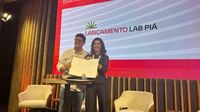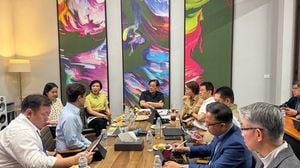The Secretarias de Inovação, Ciência e Tecnologia (Sict) and de Planejamento, Governança e Gestão (SPGG) launched the Lab Piá RS on Thursday, April 10, 2025, at the RS Innovation Stage during the South Summit Brazil. This initiative aims to connect government, startups, and society to develop innovative solutions for the challenges faced by the Executivo gaúcho.
According to Simone Stülp, the head of Sict, "We need innovation to touch people's lives. At Sict, we dream of open innovation, government innovation, public procurement, and technological orders. This is a very important moment because it brings the dynamics of South Summit into the government." Stülp emphasized the importance of dialogue with municipalities, expressing a desire to transform innovation into a strategy for national development.
The main goal of Lab Piá is to leverage the State's purchasing power to foster innovation, modernize public services, and strengthen the innovation ecosystem. Through public calls, Lab Piá will facilitate co-creation, experimentation, and implementation of new solutions, aiming to make the public sector more efficient while generating opportunities for innovative companies.
Felipe Cruzeiro, the undersecretary of the Central Licensing of the State (Celic), remarked, "Talking about innovation and public accounts sometimes frightens people. But we are pursuing concrete results because this is a great opportunity to transform people's lives." The South Summit Brazil, co-organized by the state government, runs until Friday, April 11, 2025, at Cais Mauá in Porto Alegre.
On the same day, a panel at the RS Innovation space discussed the creation of a public policy for rural addressing, with São Paulo's model presented as a replicable solution for rural areas in Rio Grande do Sul. Priscilla Fagundes, a researcher and coordinator of the Programa Rotas Rurais at the Instituto de Economia Agrícola (IEA) of São Paulo, highlighted that research indicated a significant lack of rural addressing, prompting the development of public policy. "We found that one-third of the world's population lacks an address. We developed tools using artificial intelligence to address the countryside. Today, we have 340,000 rural establishments addressed in São Paulo, reducing emergency response times by up to one and a half hours," she explained.
Fagundes noted that while they aimed to resolve economic issues for farmers, they also sought to bring citizenship to rural areas. "A total of 57,000 kilometers of rural roads that were not mapped by the public sector have been routed and structured," she added. Joel Maraschin, chief of staff at the Secretaria da Agricultura, Pecuária, Produção Sustentável e Irrigação (Seapi), emphasized the importance of granting citizenship to rural producers, indicating that Rio Grande do Sul is studying the possibility of implementing similar public policy in collaboration with São Paulo.
Domingos Velho Lopes, vice-president of the Federação da Agricultura do Rio Grande do Sul (Farsul), remarked on the changing dynamics of rural producers. "Brazil has changed its status from food importers to significant players in global food production. Today, we feed 15% of the world’s population, and by 2040 or 2050, we expect to feed 25%. The rural addressing is essential for economic competitiveness and also gives each rural producer a sense of individual citizenship," Lopes stated.
Later in the day, another panel at South Summit Brazil revealed that the state government plans to launch its first edital for hiring startups in July. The Secretaria da Fazenda (Sefaz), through the Tesouro do Estado (TE), will lead this initiative to find solutions for alimony payment demands, which account for approximately 3,600 cases annually. The Edital de Inovação Aberta is scheduled for July 17, and two startups will be selected to collaborate with Sefaz in analyzing difficulties and proposing solutions.
Eduardo Lacher, the undersecretary of TE, emphasized the importance of open innovation, stating, "We are not just talking about open innovation; we are actually doing open innovation. If innovation does not generate public value for society, it's just modernity. We work hard to create value. We need the agility of startups to help change the public sector's mindset and make processes faster." This initiative stems from the Programa de Inovação do Tesouro (PIT), which promotes integration across various entities and sectors.
The hiring process will follow the Compra Pública de Solução Inovadora (CPSI) model, which differs from traditional bidding. In CPSI, the government presents a challenge or problem without a known solution, inviting startups to apply. Selected startups will work closely with Sefaz to analyze the issue and propose viable solutions. The results will be assessed, and the government may choose to implement one or both solutions.
Jeferson Padilha, an innovation advisor at TE, noted the challenges in launching the first Edital de Inovação Aberta, stating, "It was a lot of work involved. But we are confident that by opening this door, other initiatives will follow. Those present at South Summit can help us solve the hundreds of challenges that the public sector faces."
The pilot project will focus on the Divisão de Gestão da Folha (DGF), the largest area of the subsecretary responsible for personnel payments, which involves over 300,000 active, retired, and pensioned individuals. The DGF faces challenges due to multiple systems and the need for manual processing, which increases the likelihood of errors. The selected startups will be tasked with streamlining these processes, aiming to reduce manual tasks and improve efficiency.
Looking ahead, there are plans for future initiatives related to school meal procurement and accountability, which involves significant numbers of students and meals daily. With 740,000 students across 2,300 schools in 497 municipalities, the school meal program includes 880,000 meals daily, 4,500 suppliers, and 5,000 public notices. "If we can find a personalized solution for school meal procurement, we can extend this idea to all municipalities in all states," projected Júlio Neves from the Division of Economic Studies.
The South Summit Brazil continues until April 11, 2025, at Cais Mauá, Porto Alegre, with a schedule filled with panels focused on sustainability, innovation, and technology. The sessions are streamed live on the government’s YouTube channel, allowing wider access to the discussions taking place at this significant event.






